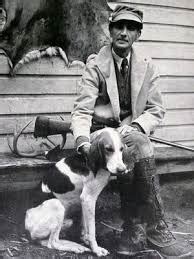A Quote by Archibald Rutledge
It has always seemed to me that any man is a better man for being a hunter. This sport confers a certain constant alertness, and develops a certain ruggedness of character....Moreover, it allies us to the pioneer past. In a deep sense, this great land of ours was won for us by hunters.
Related Quotes
This is a world that is much more uncertain than the past. In the past we were certain, we were certain it was us versus the Russians in the past. We were certain, and therefore we had huge nuclear arsenals aimed at each other to keep the peace. That's what we were certain of... You see, even though it's an uncertain world, we're certain of some things. We're certain that even though the "evil empire" may have passed, evil still remains.
As the acceptance of democracy brings a certain life-giving power, so it has its own sanctions and comforts. Perhaps the most obvious one is the curious sense which comes to us from time to time, that we belong to the whole, that a certain basic well being can never be taken away from us whatever the turn of fortune.
If you think you are beaten, you are. If you think you dare not, you don't. If you'd like to win but think you can't it's almost certain you won't. Life's battles don't always go to the stronger or faster man, but sooner or later, the man who wins is the man who thinks he can. A happy person is not a person with a certain set of circumstances, but rather a person with a certain set of attitudes. I may not be able to change the world I see around me, but I can change the way I see the world within me.
This is in us: a certain sense of denial, a certain sense of groupthink. This is not something that sits on one party line or the other. We've seen it in all permutations throughout history, and at the core of it is a certain insistence that what we want to be true is now true, and what we don't like is now false.
And what is an authentic madman? It is a man who preferred to become mad, in the socially accepted sense of the word, rather than forfeit a certain superior idea of human honor. So society has strangled in its asylums all those it wanted to get rid of or protect itself from, because they refused to become its accomplices in certain great nastinesses. For a madman is also a man whom society did not want to hear and whom it wanted to prevent from uttering certain intolerable truths.
I consider books to be good for our health, and also our spirits, and they help us to become poets or scientists, to understand the stars or else to discover them deep within the aspirations of certain characters, those who sometimes, on certain evenings, escape from the pages and walk among us humans, perhaps the most human of us all.
Twelve thousand years ago, everybody on earth was a hunter-gatherer; now almost all of us are farmers or else are fed by farmers. The spread of farming from those few sites of origin usually did not occur as a result of the hunter-gatherers' elsewhere adopting farming; hunter-gatherers tend to be conservative.... Instead, farming spread mainly through farmers' outbreeding hunters, developing more potent technology, and then killing the hunters or driving them off of all lands suitable for agriculture.
If it were possible for us to have so deep an insight into a man's character as shown both in inner and in outer actions, that every, even the least, incentive to these actions and all external occasions which affect them were so known to us that his future conduct could be predicted with as great a certainty as the occurrence of a solar or lunar eclipse, we could nevertheless still assert that the man is free.
A man of knowing attains to a sense of humour. Let this always be remembered. If you see someone who has no sense of humour, know well that that man has not known at all. If you come across a serious man, then you can be certain that he is a pretender. Knowing brings sincerity but all seriousness disappears. Knowing brings a playfulness; knowing brings a sense of humour. The sense of humour is a must.







































